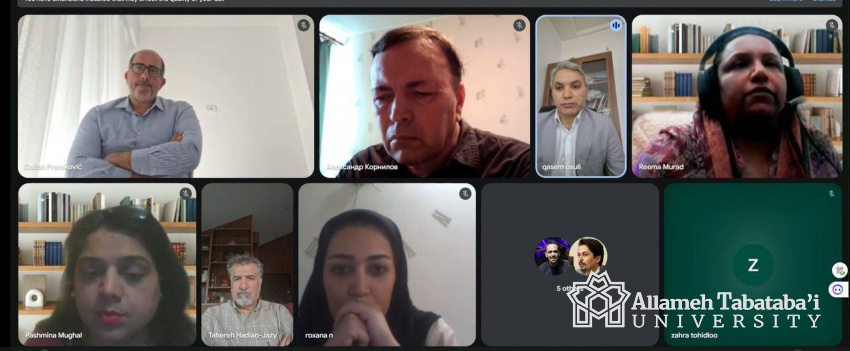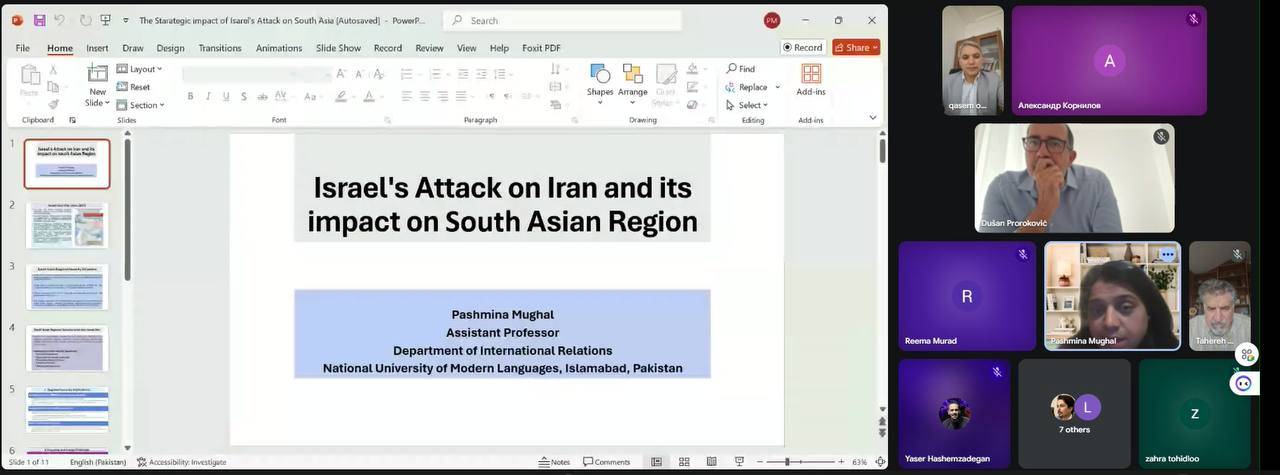Israeli Attack on Iran and the Strategic Impact on Regional and Global Security

An international webinar titled "The Israeli Attack on Iran and Its Strategic Impact on Regional and Global Security" was successfully held on 16 July 2025. The event was organized by the ECO College of Insurance at Allameh Tabataba'i University (ATU) and featured prominent academics from universities in Iran, Russia, Pakistan, and Serbia.
The webinar brought together a distinguished panel of experts, including Alexander Kornylov, Professor of International Relations at Lobachevsky University, Russia; Pashmina Mughal, Professor at the National University of Modern Languages, Pakistan; Rima Murad, Professor at the University of Management and Technology, Pakistan; Dušan Proroković, Head of the Eurasia Studies Center, Serbia; and Roxana Niknami and Nasser Hadian, Professors at the University of Tehran. Each speaker offered unique perspectives on the crisis.
Roxana Niknami, a Professor at the University of Tehran, analyzed the European Union's approach to the tensions between Iran and Israel. She asserted that the EU, by adopting a biased stance in favour of Israel, once again fueled its dual policies in the Middle East. According to Niknami, this conduct was primarily driven by political and security interests rather than professed values such as human rights and international law. She emphasized the EU's passive behaviour in this crisis, noting its failure to act as an effective mediator. Niknami then called for a review of the EU's foreign policy, particularly given the impending expiration of Resolution 2231.
Rima Murad highlighted the strategic importance of the recent June 2025 conflict between Iran and Israel for the China-Pakistan Economic Corridor (CPEC). She warned that continued conflict in the Middle East could threaten energy security, trade routes, and China's "Belt and Road" initiative, especially the Gwadar Port. Murad stressed the necessity of diplomatic, economic, and security coordination among regional countries to preserve regional cooperation. She further emphasized that coordination and regional cooperation are crucial in mitigating the strategic effects of Israel's unilateral actions. In her view, Iran, Pakistan, and China can respond appropriately to these actions through closer collaboration and diplomatic consultations.

Pashmina Mughal, a Professor at the National University of Modern Languages in Pakistan, stated that the Israeli attack on Iran has intensified anti-Western sentiment in South Asia. She suggested that extremist groups such as the Taliban and Tehrik-i-Taliban Pakistan might exploit the situation for their ideological objectives. Additionally, Mughal noted that the crisis could harm India's interests in Chabahar Port, forcing New Delhi to re-evaluate its regional policy balance. She concluded that increased prices and disruptions to trade routes would be among the economic consequences of this crisis for both Pakistan and India.
Dušan Proroković then discussed the effects of the 12-day Iran-Israel conflict in the Balkans. He pointed to political divisions within countries in the region with Muslim populations, observing that while some political elites favour Israel, public sympathy has largely shifted towards Iran and Palestine. According to Proroković, increased media activity, the growth of Islamist discourse, economic pressure, and heightened NATO movements are among the consequences of the conflict for the Balkan region. He suggested that Iran's diplomatic activities and strengthened public diplomacy in this region could increase public pressure on elites, leading them to adopt more appropriate stances.
In another section of the session, Nasser Hadian identified Netanyahu's personal characteristics, the internal conditions of the regime, Israel's and the West's perception of Iran's weakening due to the erosion of its regional proxies, the possibility of Iran acquiring a nuclear bomb, and the potential return of Donald Trump to power as the main reasons for the Israeli attack. He stated that Israel's objectives in this attack were to alter the balance of power in the Middle East, restore its military superiority, and halt Iran's nuclear program. Hadian proposed two possible scenarios for the future of this conflict: (1) the end of the war due to its prohibitive costs for both sides, with both parties exhausted and unwilling to resume or repeat it; (2) a temporary halt to the war, followed by renewed hostilities, where the ceasefire serves as a respite for regrouping before another conflict. Hadian deemed the first scenario more probable and cost-effective but stressed the need to remain prepared for the second.
Alexander Kornylov then elaborated on his home country's diplomatic stance on the recent crisis. He stated that Russia condemns Israel's military aggression but simultaneously strives to maintain its relations with both sides, given the significant number of Russian citizens residing in Israel and extensive cooperation with Iran. Kornylov sought to clarify Russia's seemingly contradictory behaviour in the crisis, as many Iranians perceived Russia's stance as inadequate. He explained that while Moscow collaborated with Tehran, Russia also maintains close ties with Israel and its Jewish population, with hundreds of thousands of Israeli Jewish residents speaking Russian. He aimed to articulate Russia's official diplomatic line and dispel any doubts about its dual approach.
The webinar concluded with a QA session, where attendees posed questions to the participating professors, who provided their expert responses.


